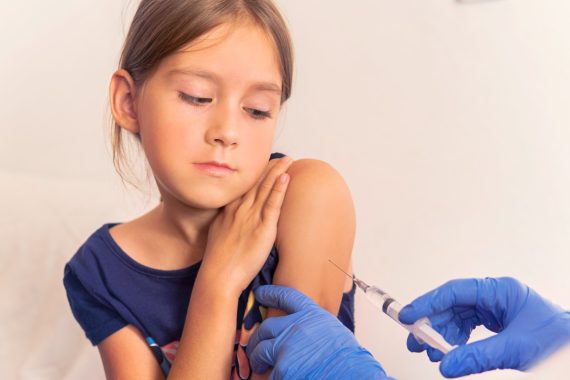Young people who missed out on HPV jab urged to contact their GP

Young people are being urged to contact their GP to arrange a catch-up on any missed HPV vaccinations, as coverage remains below pre-pandemic levels.
The UKHSA is calling on parents and guardians to ensure eligible young people are caught up with their vaccine before they leave school.
The HPV vaccine is offered to all 12 and 13-year-olds in school years 8 and 9, and follows a two-dose schedule.
The latest UKHSA report on the routine adolescent Human Papillomavirus (HPV) immunisation programme for 2021/22, which is primarily delivered in schools, shows that coverage in year 8 and year 9 pupils is yet to return to pre-pandemic levels.
The data suggest that the NHS has already caught up many children who missed out on their HPV vaccine since the start of the Covid pandemic, with dose 1 uptake improving for children in year 9 and year 10, but coverage remains below pre-pandemic levels.
Dr Vanessa Saliba, consultant epidemiologist at the UKHSA, said: ‘Children and young people who have missed out on their HPV vaccinations should contact their school nurse, school immunisation team or GP surgery to arrange a catch-up – they remain eligible until their 25th birthday.
‘The HPV vaccine is available for girls and boys in year 8 and we encourage everyone eligible to take up this potentially life-saving vaccine when offered.
‘In recent years we have seen vaccine coverage fall due to the challenges posed by the pandemic.
‘Many young people who missed out on their vaccinations have already been caught up, but more needs to be done to ensure all those eligible are vaccinated.
‘In addition to HPV vaccination of young people, all women aged 25 and over in England are offered cervical screening which can detect early signs of disease and so also prevents cancers and deaths.
‘The HPV vaccine will prevent most cervical cancer cases, but not all, and so even vaccinated women should still attend for cervical screening when invited to do so.
‘And if you’ve missed your appointment it’s important you arrange another screening as soon as possible.’
Minister for women’s health Maria Caulfield said: ‘As a nurse who has worked on cancer units, I have seen first-hand the importance of HPV vaccination in saving countless lives by preventing cervical cancer.
‘We’re improving the cervical cancer screening process, including opening up 24/7 laboratory screening and expanding the location options available – so people can get their tests easier and results faster.
‘I encourage all 12 and 13-year-olds who are offered this vaccine to take it – it could save your life.’
Samantha Dixon, chief executive at Jo’s Cervical Cancer Trust: ‘We have the evidence that shows the HPV vaccine is stopping young women from developing cervical cancer, and that’s an incredible thing.
‘Around nine women are diagnosed with cervical cancer every day in the UK and the vaccine is helping to change that.
‘I’d urge anyone who is eligible to take up the offer. Whether you have been vaccinated or not, going for cervical screening remains important to help further reduce your risk of cervical cancer.’
Although the HPV vaccination is normally given to children around the ages of 12 or 13 to protect them from cervical cancer later in life, last year a study suggested a preventive HPV vaccine alongside treatment for CIN might help to reduce the risk in women who have been treated for CIN3.
Last year, NHS England warned that privately bought at-home testing kits for HPV should not be used to make decisions about cervical screening.
Pulse October survey
Take our July 2025 survey to potentially win £1.000 worth of tokens

Visit Pulse Reference for details on 140 symptoms, including easily searchable symptoms and categories, offering you a free platform to check symptoms and receive potential diagnoses during consultations.












